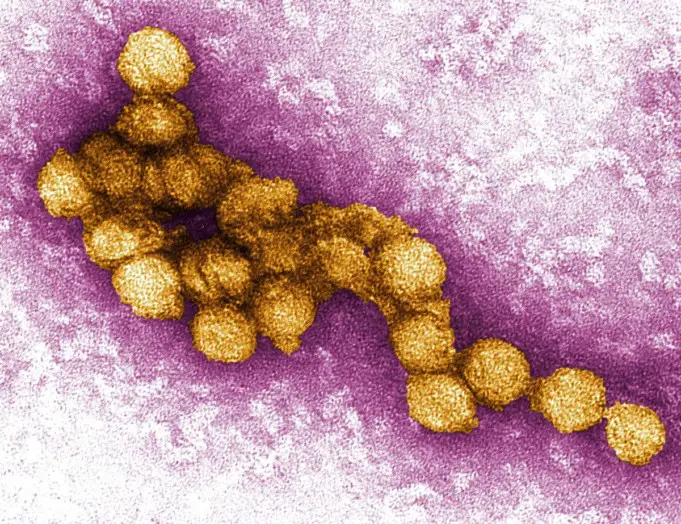The West Nile Virus is an RNA virus that is responsible for causing West Nile Fever. The virus is a member of the family Flaviviridae. Zika virus, yellow fever virus, and dengue virus all belong to the family.
West Nile virus is primarily transmitted mosquitoes, especially those of the Culex species. Birds are the primary hosts of the infection.
West Nile virus can cause neurological damage in humans. However, most people infected with the virus don’t develop symptoms or may have only mild cases of the disease.
Some people may develop life-threatening conditions such as inflammation of the brain or spinal cord in rare cases. Mild symptoms of the infection typically go away on their own.
Severe symptoms such as fever, confusion, severe headache, or sudden fatigue require immediate medical attention.
The virus was first isolated in a woman in Uganda’s West Nile district in 1937. It was. In 1953, the virus was identified in birds in the Nile delta region. Human infections of the West Nile Virus have been reported globally for over 50 years.
A virulent outbreak of the disease in Israel and Tunisian in 1999 was imported from New York. This outbreak spread through the US in the following years.
The largest outbreaks of the disease occurred in Israel, Greece, Romania, and the USA. The sites of the outbreaks were majorly concentrated along major bird migratory routes.
Cause and Transmission of West Nile Virus
Human infection of the West Nile Virus typically occurs as a result of bites from infected mosquitoes. These mosquitoes become infected when they feed on infected birds.
The virus circulates in the mosquito’s bloodstream for a few days and eventually gets to the mosquito’s salivary glands. During later blood meals, the virus enters the bloodstream of humans and animals, where it multiplies and possibly causes illness.
West Nile Virus can also be transmitted via contact with other infected animals, their blood, or other tissues. The virus can also be passed through organ transplants, blood transfusions, and breast milk.
Risk Factors
Anyone can be infected by the virus when they get bitten by an infected mosquito. However, only about 1% of people who are bitten develop life-threatening symptoms.
Older people (people above 60) are more likely to develop severe symptoms of the disease when they get infected. Medical conditions that may increase the risk of experiencing severe symptoms include kidney conditions
- Diabetes
- Impaired immune system
- Cancer
- Hypertension
Signs and Symptoms of West Nile Virus
Symptoms of the West Nile virus usually appear within 3-14 days of being bitten. The symptoms may vary in severity. Symptoms for mild infection of the disease include:
- Fever
- Rash on your chest, stomach, or back
- Body aches
- Headache
- Vomiting
- Nausea
- Swollen lymph glands
Severe symptoms can include:
- Fever
- Confusion
- Vision loss
- Muscle weakness
- Convulsions
- Paralysis
- Numbness
- Coma
Diagnosis
West Nile Virus can be diagnosed using a simple blood test in most cases. This helps to determine if the patient has antibodies in their blood that is linked with the West Nile virus.
For severe brain-related symptoms, the doctor may order a procedure called a lumbar puncture (also known as a spinal tap). The method involves inserting a needle into the spine to extract fluid.
West Nile virus can increase the white blood cell count in the fluid, therefore indicating an infection. Imaging scans such as MRI or CAT scan can help detect inflammation and brain swelling.
Treatment
Because the disease is caused by a virus, the condition has no cure. Most people usually recover from the illness on their own. Over-the-counter pain medication such as aspirin or ibuprofen can be used to relieve symptoms of the virus like headaches and muscle aches.
The doctor may administer intravenous fluids and medication when there is brain swelling or other severe symptoms.
There is ongoing research on the efficacy of interferon therapy for the virus. This therapy aims to use substances produced by the immune system to treat encephalitis in people infected with the virus.
Other treatments being researched on encephalitis caused by West Nile virus include:
- Polyclonal immunoglobulin intravenous (IGIV)
- Corticosteroids
- WNV recombinant humanized monoclonal antibody (MGAWN1)
Prevention
The best way to prevent the West Nile virus and other mosquito-borne illnesses is to avoid exposure to mosquitoes and areas with stagnant water, a breeding ground for mosquitoes.
The following measures can be used to prevent mosquitoes in your immediate environment:
- Unclog roof gutters.
- Take away old tires or unused containers that might hold water and serve as a breeding place for mosquitoes.
- Install screens on windows and doors.
- Change water in bird baths and pet bowls regularly.
- Empty, unused swimming pools or open standing water on pool covers.
To reduce your exposure to mosquitoes:
- Avoid unnecessary outdoor activity when mosquitoes are most common.
- Apply mosquito repellent containing an Environmental Protection Agency-registered insect repellent to your skin and clothing.
- When outside, cover your infant’s stroller or playpen with mosquito netting.
- Wear long-sleeved shirts and long pants when outdoors.
Sources;
- West Nile Virus – CDC
- West Nile Virus – Wikipedia
- West Nile Virus – MayoClinic
- What Is West Nile Virus Infection (West Nile Fever)? – Healthline












